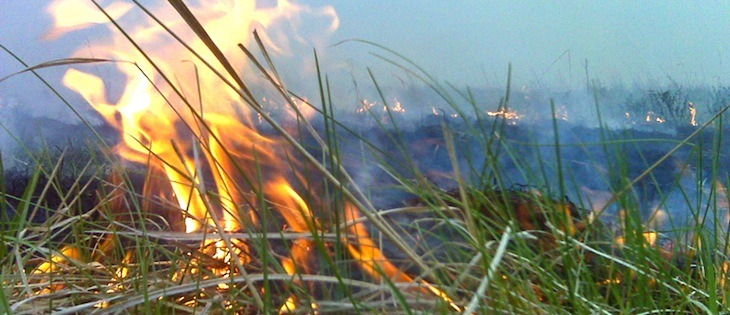Smoke from burning farm fields may be a necessary inconvenience in the Delta
by November 1, 2017 4:14 pm 3,138 views

Northeast Arkansas skies are filled each fall with plumes of smoke rising from row crop fields set on fire intentionally by farmers. Motorists and residents complain about the smoke, and petitions have been signed to stop the practice. But, it may be necessary.
“Contrary to many beliefs out there, burning of crop residue is a recommended crop management practice,” said rice agronomist Dr. Jarrod Hardke.
Farmers often use drip torches to start controlled fires in fields after the harvest. Hundreds of thousands of acres are burned in the Delta region each year. A lot of organic refuse is left after the harvest, and it needs to be removed to prepare fields for the next growing season, Hardke said. The refuse can also provide shelter for nuisance weeds and insects that can be detrimental to future crops. Fires can eliminate potential diseases, according to the University of Arkansas System Division of Agriculture.
“There is a need to burn crop residue as a means of pest management,” he said. “In addition, hard-to-control weed species can be eliminated by burning residue. This practice is another tool in the toolbox for growers to effectively manage their farms.”
Burning is used by rice, wheat, soybean and corn growers. Rice growers use it the most, with about 25% of Arkansas rice fields being burned. Fire isn’t always necessary, but it’s especially helpful in rice to manage problematic residue. Waiting on the residue to breakdown during winter can be a gamble. Winter conditions can slow breakdown and result in increased tillage and delayed planting, resulting in increased production costs and lower yields in some cases. In fields that cannot rotate to crops other than rice, excessive remaining residue in the field can be detrimental to future rice crops.
“Rice residue can be slow to break down,” Hardke said. “To prepare the field for the next season, it can be very beneficial to remove residue by burning, because tillage alone is not always sufficient to remove it for fall field preparation.”
There are many factors that can impact a burn and the amount of smoke it produces, including the length of time and weather conditions since harvest and the way the residue has been managed with tillage equipment. In many rice fields, only 30%-40% of residue, mostly loose straw, may be burned, he said. Where the residue has been laid flat to the soil, about 80% may be burned. The amount of moisture or still-green matter left in plant residue can impact the amount of smoke produced from a burn. Burning in crop fields mimics what nature does to prairie land and other ecosystems, he said.
“If we weren’t here and this was all still prairie, it would burn and regrow every few years,” he said. “Fire is nature’s way of reducing residue in some systems and we can continue to use it to our advantage.”
Burning is not a necessity in every case. Vital compounds in the plant refuse can be lost during a controlled burn.
“Nutrients are tied up in residue and some of these can be lost if residue is burned,” Hardke said. “So, where there is not a definable benefit for burning, it’s advised to avoid the practice.”
Residue burning has attracted criticism because of its potential effects on air quality. There are online petitions seeking to end the practice of burning, and when smoky haze appears around cities and communities, speculation in social media often points to rice fields, he said. Most farmers make an effort to not impact their neighbors and communities with smoke. Hardke said while research and extension can improve practices and timing, farmers still need to be able to burn crop residue to effectively manage their land in many situations.
“In production agriculture, most farmers make a legitimate effort not to affect any neighbor when they need to burn a field. However, winds change and inversion conditions can set in without warning. These are not excuses, just acknowledgment that sometimes even the best intentions can be overturned by unpredictable conditions,” he said.
